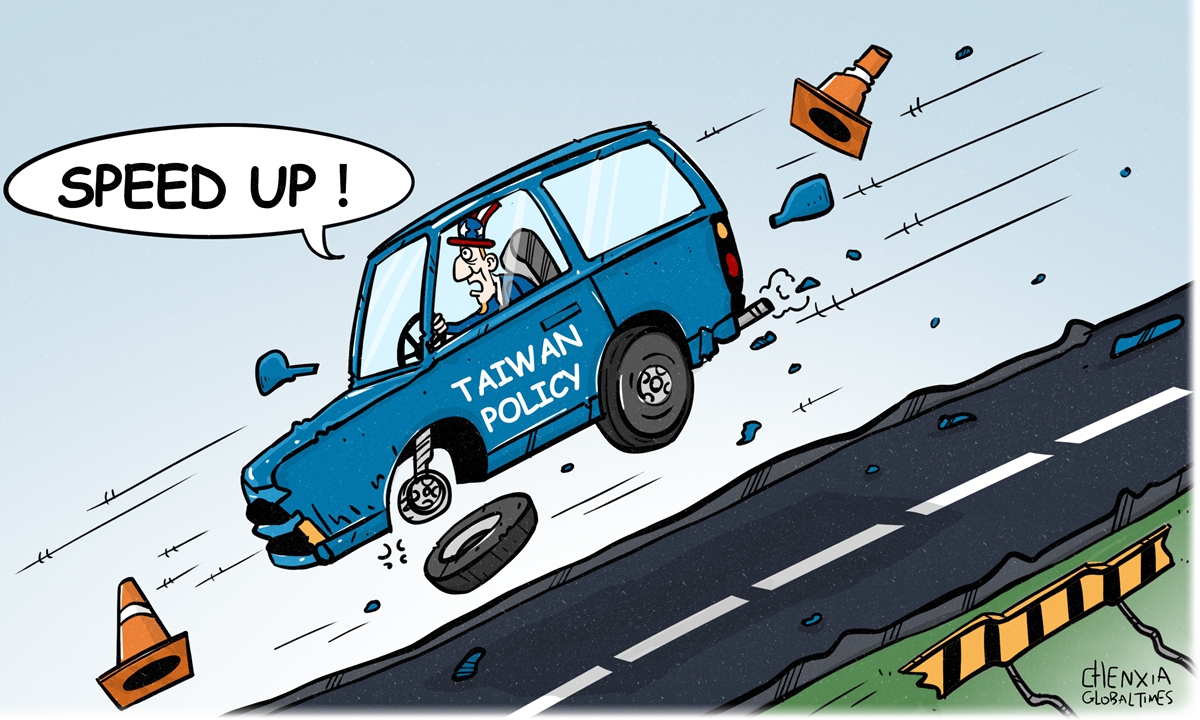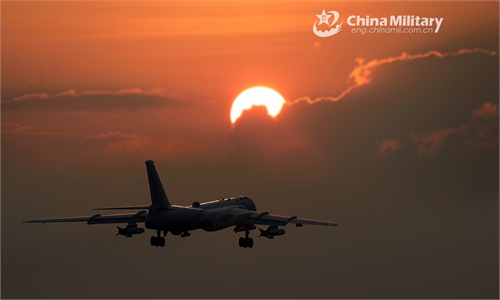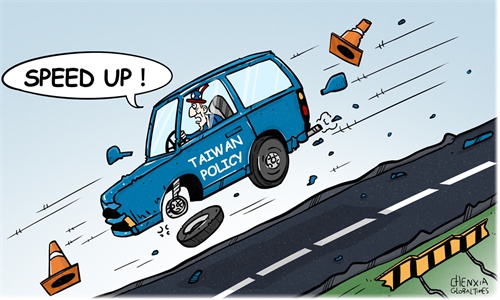PLA holds fire strike drills around Taiwan island after US defense bill provokes China

US Taiwan policy Illustration: Chen Xia/GT
The Chinese People's Liberation Army (PLA) Eastern Theater Command on Sunday organized cross-service joint combat alert patrols and joint fire strike exercises in maritime and aerial areas around the island of Taiwan after the US continued down a provocative and dangerous path of playing the "Taiwan card" to suppress China with its latest defense bill, including $10 billion in security assistance and fast-tracked weapons procurement for the island.
In a resolute response to the recent escalation in the US-Taiwan collusion, Senior Colonel Shi Yi, a spokesperson of the PLA Eastern Theater Command, said in a statement on Sunday that the command troops will take any necessary measures to resolutely safeguard national sovereignty and territorial integrity.
Photos released with the statement show that the H-6 strategic bomber and the Type 052C guided missile destroyer are some of the forces that took part in the exercises, and warplanes were able to visually confirm the Central Mountain Range of the Taiwan island.
Given that the US' National Defense Authorization Act for Fiscal Year 2023, which contains a large number of negative provisions targeting China and signed by the US President Joe Biden on Friday, marked the first time the US government will finance weapons for the island, multiple Chinese government departments, including the Ministry of National Defense, Ministry of Foreign Affairs, Taiwan Affairs Office of the State Council and the Foreign Affairs Committee of the National People's Congress (NPC), have voiced opposition to the US' defense act.
The US defense act mentions "China" and "Chinese" 331 times, "Taiwan" 467 times, "Ukraine" and "Ukrainian" 165 times, and "Russia" &"Russian" 401 times, which prompted a question from Chinese observers “has any other country mentioned other countries and regions so many times in its national defense act?”
Senior Colonel Tan Kefei, spokesperson for China's Ministry of National Defense, said in a statement released on Saturday that "China is strongly dissatisfied with and firmly opposed to the US' move, and has lodged solemn representations with the US side."
Tan said that for a certain period, the US has been constantly hollowing out and distorting the one-China principle, frequently selling arms to the Taiwan island, strengthening its military connection with the island, and concocting Taiwan-related acts that damage China's sovereignty, which seriously jeopardizes peace and stability in the Taiwan Straits and increases the risk of a China-US military confrontation.
"The Chinese People's Liberation Army will, as always, be ready to resolutely safeguard national reunification and the territorial integrity of the country," Tan stressed.
You Wenze, a spokesperson of the Foreign Affairs Committee of the NPC, on Saturday also voiced strong dissatisfaction with and firm opposition to the China-related content of the new US defense act. Any attempts to use the island to contain China or support the separatist forces for "Taiwan independence" will only further escalate tensions across the Taiwan Straits and undermine the political foundation of China-US relations, You said.
"Any provocation that attempts to interfere in China's internal affairs and undermine China's interests will be met with firm countermeasures," You said.
The new act stipulates that the US government will provide Taiwan with $10 billion as military aid and $2 billion as military loans within five years, and will accelerate arms sales to the Taiwan island. This further indicates that some forces in the US are trying to support the "Taiwan independence" secessionists with arms in the military, provoking confrontation across the Taiwan Straits and pushing the two sides of the Straits to the brink of war, Zhu Fenglian, spokesperson for the Taiwan Affairs Office, said in a statement on Saturday.
Referring to the Taiwan question, Wang Yi, member of the Political Bureau of the Communist Party of China Central Committee, state councilor and foreign minister, said on Sunday at the Symposium on the International Situation and China's Foreign Relations that "we have not been intimidated by any hegemonic power or its bullying, and have acted resolutely to safeguard China's core interests and national dignity."
"The Taiwan question is at the very core of China's core interests. It is the bedrock of the political foundation of China-US relations, and a red line that must not be crossed in China-US relations," Wang said.
Two days ago, Wang had a phone call with US Secretary of State Antony Blinken, in which he pointed out that the US should not pursue dialogue and cooperation while containing and stabbing China in the back.
The US legislated its arms sales to the Taiwan region, which seriously provoked China's core interests and sent a supportive signal to the "Taiwan independence" secessionists, Xin Qiang, deputy director of the Center for American Studies at Fudan University, told the Global Times on Sunday, saying that it was another serious escalation by the US in strengthening military ties with the island.
In the future, the US is likely to sell advanced weapons and equipment to the Taiwan authorities instead of secondhand, defective weapons and equipment like it sold in the past, Song Zhongping, a Chinese military expert and TV commentator, told the Global Times.
Given that a formal opinion was also written into the act urging the Pentagon to have the Taiwan region be part of the 2024 Rim of the Pacific joint exercises, Song believes that Washington could push the Taiwan authorities, especially the local military, further into the international community and strengthen military exchanges, as well as send more troops to the island in an attempt to help the secessionist authorities resist the process of reunification.
The defense act also requires the responsible authorities to prioritize and, with no bundled arrangement allowed, expedite the processing of Taiwan's arms purchase requests, which Song said would cause the Taiwan authorities to invest more money to buy more weapons and equipment, thus intensifying tensions across the Straits and making military conflicts more possible.
Xin said that after the passage of the defense bill, an "arms race" and "military conflicts" are more possible but the island is far from capable of having an arms race with the Chinese mainland.
The bill, which again exposed the US' continuous maneuvers of hollowing out and distorting the one-China principle, will surely trigger China's countermeasures, the expert warned.





